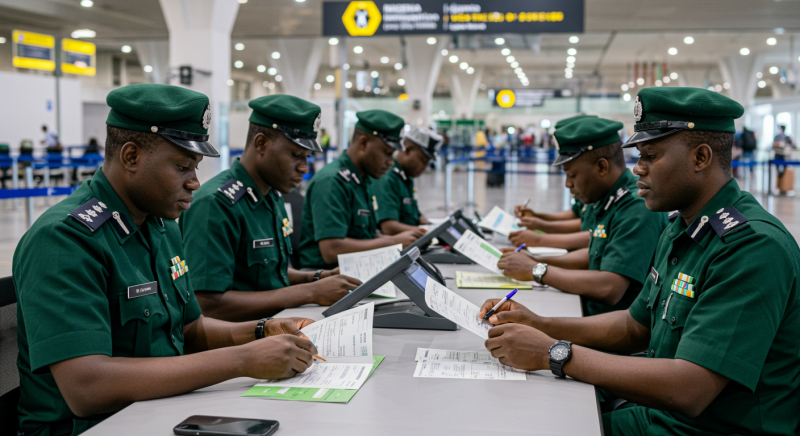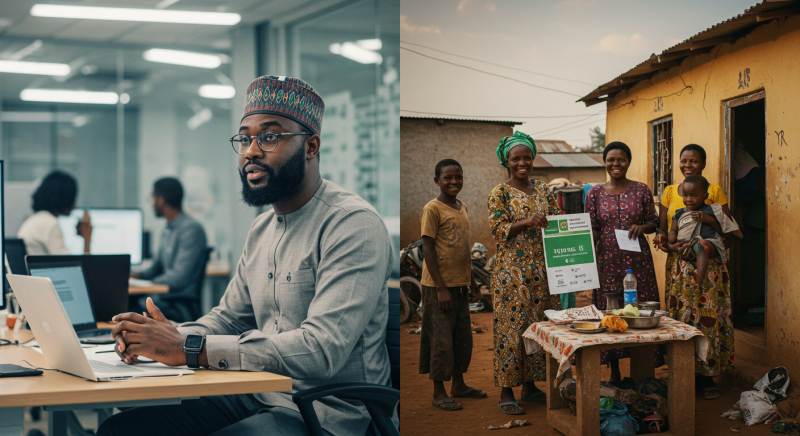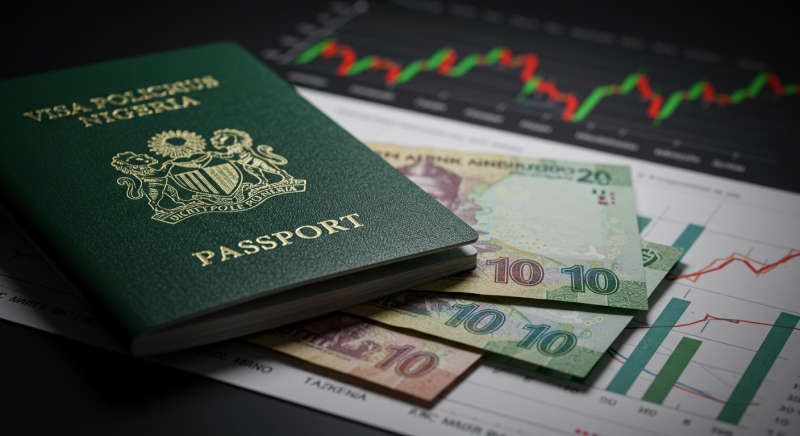The Hidden Economic Story Behind Visa Policies in Nigeria
The complex relationship between Visa Policies in Nigeria and the country’s economic trajectory represents one of the most consequential yet underexplored dimensions of Nigeria’s development story. When we examine how Visa Policies in Nigeria shapes both domestic growth and international relations, we uncover a fascinating narrative of cause and effect that touches every aspect of the nation’s economic health.
Nigeria, Africa’s most populous nation and largest economy, finds itself at a crossroads where its Visa Policies decisions carry profound implications for its 220+ million citizens and estimated 17 million diaspora members worldwide.
“The way a nation structures its Visa Policies often reveals more about its economic strategy than any official development plan ever could.” — Economic Affairs Analyst
The emotional toll of these policies extends beyond mere inconvenience—they represent life-altering barriers or opportunities for families, businesses, and communities that span continents. Every change in Visa Policies ripples through countless personal and professional lives.
Key Takeaways:
- Recent changes to Visa Policies in Nigeria have significantly altered remittance flows, which account for nearly 6% of Nigeria’s GDP
- Restrictive Visa Policies in Nigeria may reduce brain drain but also limit knowledge transfer and international investment
- Strategic adjustments to Visa Policies could potentially unlock billions in additional diaspora investments
- The relationship between Visa Policies in Nigeria and economic indicators demonstrates clear causative patterns
- Both sending and receiving countries must reconsider their Visa Policies in Nigeria to maximize mutual economic benefits

Understanding the Economic Influence of Visa Policies in Nigeria
The relationship between Visa Policies in Nigeria and economic performance manifests in several distinct channels. The most immediate impact appears in remittance patterns—financial lifelines that reached approximately $20.9 billion in 2023, according to the World Bank’s Migration and Remittances Data.
When Visa Policies becomes more restrictive, we observe two competing effects: reduced outward migration potentially preserving local talent, but also constrained remittance flows that many communities depend upon for essential services and consumption. Research from the International Monetary Fund suggests these financial flows often demonstrate remarkable resilience even during economic downturns, making Visa Policies decisions particularly consequential.
“The sensitivity of economic indicators to changes in Visa Policies reveals how deeply integrated global mobility has become with national development trajectories,” notes Dr. Adebayo Olukoshi, development economist at the Nigerian Institute of International Affairs.
How Visa Policies Nigeria Reshapes Diaspora Relationships
The Nigerian diaspora, one of Africa’s largest and most influential, maintains complex connections with their homeland that Visa Policies in Nigeria either strengthens or weakens. Beyond simply sending money, diaspora communities facilitate knowledge transfer, establish business connections, and often represent Nigeria’s interests informally abroad.
When Visa Policies Nigeria creates barriers to circular migration—the ability to move freely between host and home countries—we observe reduced diaspora engagement across multiple dimensions. The Nigerians in Diaspora Commission documents how restrictive Visa Policies Nigeria correlates with diminished participation in homeland development projects.
Conversely, when Visa Policies Nigeria facilitates easier movement, diaspora investment typically surges. The “Diaspora Bond” initiative, which raised $300 million in 2017, demonstrates the untapped potential that more favorable Visa Policies Nigeria could unleash.
The Surprising Benefits of Strategic Visa Policies in Nigeria
Although conventional wisdom often emphasizes the drawbacks of emigration, thoughtfully designed Visa Policies Nigeria can actually accelerate development through several mechanisms:
Education arbitrage becomes possible when Visa Policies allows citizens to access world-class training abroad before returning with enhanced skills. Countries like South Korea and China have historically leveraged similar visa arrangements to build domestic capacity.
Technology transfer accelerates when Visa Policies encourages diaspora professionals to maintain connections with homeland industries. The success of India’s IT sector partly stems from knowledge networks that Visa Policies Nigeria equivalents in that country deliberately fostered.
Foreign direct investment often follows human connections. When Visa Policies nurtures these relationships rather than severing them, financial flows typically increase. Evidence from the African Development Bank suggests diaspora investors accept lower returns than typical foreign investors when investing in their countries of origin.
Navigating the Practical Challenges of Visa Policies in Nigeria

For individuals and families dealing with the real-world implications of Visa Policies Nigeria, understanding the system proves essential. Here’s how to better navigate these challenges:
First, recognize that Visa Policies operates bidirectionally—both Nigeria’s policies for visitors and other nations’ policies toward Nigerians. This distinction matters because different strategies apply to each direction.
For diaspora Nigerians, maintaining valid documentation proactively helps avoid complications when Visa Policies shifts unexpectedly. The Nigerian Immigration Service occasionally announces changes to Visa Policies Nigeria with minimal notice, requiring vigilance.
Business travelers should leverage Nigeria’s recently expanded visa-on-arrival program, part of the reformed Visa Policies aimed at improving the ease of doing business. Registration through the Nigerian Immigration Service Portal remains essential despite these improvements.
Students pursuing education abroad must navigate increasingly complex Visa Policies and destination country requirements. Success rates for student visa applications have fluctuated dramatically, with acceptance rates for some destination countries dropping below 30% in recent years.
“The key to successfully navigating Visa Policies Nigeria involves preparation, persistence, and understanding the broader policy context,” advises immigration consultant Funmi Adebari. “Most rejections stem from inconsistencies in documentation rather than outright ineligibility.”
The Socioeconomic Ripple Effects of Visa Policies in Nigeria
Beyond measurable economic indicators, Visa Policies creates far-reaching social consequences. Communities with high emigration rates often develop distinctive characteristics—what sociologists term “migration cultures”—where international mobility becomes normalized despite Visa Policies obstacles.
Gender dynamics shift noticeably in response to Visa Policies patterns. When male emigration predominates due to gendered Visa Policies effects in receiving countries, female-headed households increase in sending communities, altering traditional social structures.
Intergenerational mobility—the ability of children to exceed their parents’ economic status—correlates strongly with access to international opportunities that Visa Policies either enables or constrains. Research from the Center for Global Development suggests that remittances from those who successfully navigate Visa Policies barriers significantly increase educational investment in recipient families.
Future Directions for Visa Policies in Nigeria
The evolution of Visa Policies will likely follow several emerging trends that policymakers and citizens should monitor:
Skill-based selectivity in global Visa Policies continues intensifying, creating asymmetric opportunities based on education and profession. Nigeria’s domestic education system must adapt to this reality.
Regional integration through ECOWAS may partially counterbalance restrictive Visa Policies from traditional destination countries, creating new migration pathways within West Africa.
Climate change will increasingly influence Visa Policies as environmental displacement grows. Nigeria’s vulnerability to climate impacts may intensify emigration pressure regardless of Visa Policies restrictions.
Digital nomad and remote work visas represent an emerging frontier in Visa Policies Nigeria that Nigeria could leverage to attract global talent and investment.
Conclusion: Reimagining Visa Policies in Nigeria for Shared Prosperity
The relationship between Visa Policies in Nigeria and economic development demands nuanced understanding rather than simplistic policy responses. Nigeria’s future prosperity depends partly on crafting Visa Policies approaches that maximize benefits while minimizing drawbacks of international mobility.
The evidence suggests that Visa Policies functions best when conceptualized as a development tool rather than merely a regulatory or security framework. Countries that view Visa Policies through this developmental lens typically achieve better outcomes across multiple dimensions.
For individual Nigerians, navigating Visa Policies will remain challenging but potentially rewarding. The diaspora’s continued engagement despite Visa Policies hurdles demonstrates remarkable resilience and commitment to homeland development.
As global mobility systems evolve, Visa Policies will continuously adapt. The most successful approaches will balance legitimate regulatory concerns with recognition of the profound economic potential that thoughtful Visa Policies can unlock.

Frequently Asked Questions
How do recent changes to Visa Policies Nigeria affect diaspora remittances?
Recent adjustments to Visa Policies have created mixed effects on remittance flows. While stricter emigration controls theoretically reduce the diaspora population, existing overseas Nigerians continue sending substantial funds home. The Central Bank of Nigeria reports that despite tightening Visa Policies in destination countries, remittances have shown resilience, though growth rates have moderated compared to previous decades.
Can Nigeria benefit economically from more liberal Visa Policies?
Evidence suggests that strategically liberalized Visa Policies could yield significant economic benefits. Countries with more flexible approaches to diaspora mobility typically experience higher rates of knowledge transfer, increased foreign direct investment, and stronger trade relationships. However, these benefits depend on complementary policies that maximize diaspora engagement beyond simply relaxing Visa Policies restrictions.
How do Visa Policies Nigeria compare with other African nations?
Nigeria’s approach to Visa Policies generally ranks as moderately restrictive compared to continental peers. Rwanda and Kenya have implemented more progressive Visa Policies frameworks that actively court international talent and investment. Ghana’s recent “Year of Return” initiative demonstrates how targeted Visa Policies programs can attract diaspora tourism and investment. Nigeria has made improvements through its visa-on-arrival program but lags behind the most innovative Visa Policies approaches on the continent.
What documentation do Nigerians need when navigating international Visa Policies?
Successfully navigating international Visa Policies requires several key documents: a valid Nigerian passport with at least six months validity beyond intended travel, financial statements demonstrating sufficient funds, proof of accommodation arrangements, detailed travel itineraries, and often evidence of strong ties to Nigeria that suggest return intention. As Visa Policies worldwide has grown more complex, documentation requirements have expanded correspondingly.
How do Visa Policies in Nigeria affect Nigerian students pursuing international education?
Visa Policies significantly impacts educational migration pathways. Nigerian students face varying acceptance rates depending on destination country Visa Policies approaches. The UK, Canada, and Australia implement points-based Visa Policies systems that evaluate academic qualifications, financial capacity, and other factors. Recent Visa Policies in Nigeria trends show tightening restrictions in traditional study destinations, prompting diversification toward emerging education hubs with more accommodating Visa Policies in Nigeria.
READ MORE
How to Negotiate Visa Sponsorship With Your Employer | Expert Guide 2025
